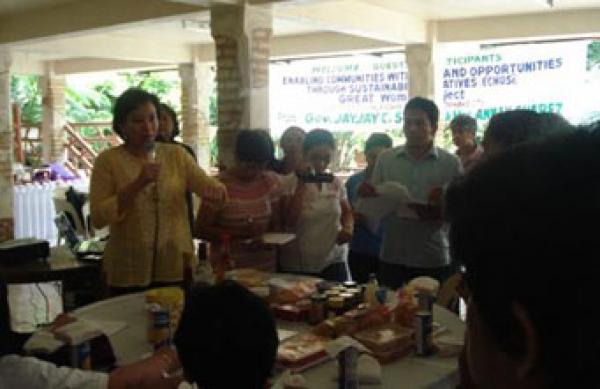GREAT Women Project Sponsors Second Intensive Design Clinic for Women Microentrepreneurs

GREAT Women Project and a team of consultants from ECHOSI Foundation conducted a second round of Design Clinic with women microentrepreneurs (WMEs) of Quezon last July 17 in Lucena City. The Design Clinic aims to level-up women’s products all over the country so they can penetrate new markets at the local, national and international levels. The First Intensive Design Clinic was done in January this year and will be subsequently rolled out to the other GREAT Women Project sites in Metro Naga in Camarines Sur, Bohol, Leyte, Davao, PALMA+PB Alliance in North Cotabato, and possibly, Ifugao.
Designers Jeannie Javelosa and Tess Pasola, assessed and gave recommendations for enhancements in terms of the products’ taste, look and feel for 31 WME products. Women microentrepreneurs came from the municipalities in Quezon, namely, Real, Pagdilao, Tayabas, Macalelon, Lopez, Lucena, Calauag, Mauban and Gumaca. The Design Team was joined by empowerment advocate and former Ambassador Romy Manalo and Imelda Canuela, Project Officer for ECHOSI. National government agency officers Pablito Budoy (Department of Trade and Industry) and Jenny Ann Nabia (Department of Science and Technology) were present to find areas of intervention and collaboration to assist the WMEs.
“Women microentrepreneurs (WMEs) should develop products that could break through at least two markets, and not just one,” Javellosa challenged women microentrepreneurs. Javellosa represents the Enabling Communities with Hope and Opportunities Sustainable Initiatives (ECHOSI) Foundation, a non-profit organization that promotes products of local social enterprises, women microenterprises and cultural communities.
To enter new markets, WMEs must focus on consistent high product quality and strong production capacity. Markets can vary from retail, niche, online, export, and other markets. Once WME products are viable in the market, microfinance for capital easily becomes available to women microentrepreneurs resulting to increased income and eventually giving way to financial freedom.
GREAT Women Project, with technical and funding assistance from the Canadian International Development Agency, tapped the expertise of ECHOSI experts and LGU partners for the Intensive Design Clinics for Project-assisted WME beneficiaries throughout the country.
Recommendations for product improvement during the Intensive Design Clinic ranged from using eco-friendly packaging, product costing, R and D such as developing variants of products, labeling, getting design ideas and trends for non-food products, enhancing the “look and feel” of the products and the importance of food and drug licenses for food products.
WMEs agreed to enhance their product samples for initial market testing at an agreed timeframe. Samples will be consolidated by the Quezon Local Area Coordinator, Conrad Vargas and then sent to ECHOStore for evaluation and market testing. WMEs with food products were encouraged to attend orientation on food and drug licensing, before undergoing other technical assistance on labeling and packaging.
DTI will address technical concerns on product costing and vacuum-sealing of food products. DTI-Quezon also invited WMEs to an Orientation on Food and Drug Approval in SM Lucena, on July 19. DOST is ready to provide labeling and packaging assistance to FDA-approved food products.
Among products that showed potential for the national or wider retail markets, are katmon jelly, calamansi concentrate, atsara na sili and woven bottle bags. Other WMEs were asked to enhance their products with new designs and variants that may suit retail, online and other ready markets. By December, GREAT Women Project and ECHOSI expected to have developed some high-quality and market-ready products from project-assisted WMEs in Quezon as well as other project partner sites.

